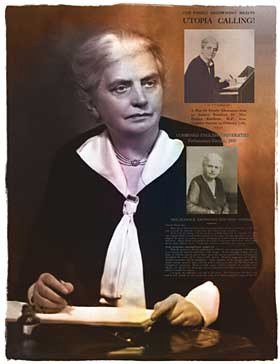One woman joined this chorus: Eleanor Rathbone, the Independent member for the Combined English Universities. She must have seemed an unlikely "anti-appeaser." The middle-aged Rathbone had entered Parliament in 1929 as a social reformer and a feminist. Born into a progressive Liverpool merchant family, she had honed her political skillsand her feminismon the streets of that fiercely partisan port city. From the 1890s to World War I, she helped establish a network of social services for women and children in Liverpool, won election as the first woman on the Liverpool City Council, and was the brains behind the constitutionalist women's suffrage movement on Merseyside. She also gained a national reputation as a sophisticated and radical thinker on questions of poverty. Her studies of Liverpool's labor market and her work with local women convinced her that families could not be supported by wages alone. "[T]he rearing of families is not a sort of masculine hobby, like tobacco smoking or pigeon flying," she wrote. Why support it "by the clumsy device of paying men wage-earners more than women"? Mothers' arduous work deserved remuneration; the support of children should be a collective charge.
By 1918, Rathbone was arguing for a system of family allowances paid directly to mothers; in 1924, in The Disinherited Family, she elaborated that case. The economic collapse of 1929 smashed such utopian ideas. Through the terrible early years of the Depression, Rathbone allied with medical experts, churchmen, and dissident M.P.s to win cheap milk and better benefits for the children of the unemployed. These were hard-fought battles for tiny improvements, but Rathbone, a "confirmed thin-end-of-the-wedger," knew that they saved many children from hunger.
The Nazi seizure of power in 1933 pushed her poverty work to the sidelines. Between 1933 and 1939, Rathbone became one of the harshest parliamentary critics of appeasement. In the House, on public platforms, and in the press, she denounced the government's indifference toward the Italian conquest of Abyssinia, its unwillingness to defend republican Spain, its betrayal of Czechoslovakia. The fate of minorities or dissidents in the fascist states filled her with foreboding and horror. She felt as if she were standing outside bars behind which people were being tortured, she once wrote. "We scrape at the bars with little files. A few victims are dragged painfully one by one through the gaps."
She scraped as hard as she could, setting up a "Parliamentary Committee for Refugees" to take up individual cases. Occasionallyas when she tried to hire a ship to run the blockade of Spain and remove Republicans at risk from reprisalsher activities skirted legality. Small wonder Foreign Office officials found dealing with their "daily bunch of letters from Miss Rathbone, M.P." rather wearing, that undersecretaries would duck behind pillars when they saw her coming, that Neville Chamberlain detested her. But when Jan Karski reached Britain in late 1942, bringing his eyewitness account of the systematic murder of Jews in Poland, Rathbone was one of the people he contacted. A passionate if unavailing crusade for their "rescue" marked the last years of her life.
 |
| Rathbone in the 1930s, and examples of her campaign flyers |
| Photomontage by Bartek Malysa. Photographs courtesy of the University of Liverpool Library. |
The only woman M.P. between the world wars to profess herself a "whole-hearted feminist," Rathbone never saw a contradiction between women's rights and anti-appeasement. In her mind, the causes were related. The 1930s saw a struggle less between states than between rival political systemsand in only one of those systems, she thought, could women have a stake. Unlike Virginia Woolf, who thought women could uphold peace by renouncing all loyalties to country, Rathbone insisted that women defend the democratic ideals on which their own liberties were based.
The campaign for family allowances, which had stalled in the '30s, revived during World War II amid national concern over population decline and family poverty. The only major plank of the postwar welfare state to be passed during the war itself, family allowancesand the particular form they tookowed much to Rathbone's ideas. In her last Commons battle, she mobilized M.P.s to insist that the new grants be paid by statute to the mother.
"Those who have the fortune, or misfortune, to have some cause at heart which goes a good way ahead of current public opinion and is poor in influential supporters and material resources," Rathbone once wrote, "must be prepared to combine the qualities and methods of Sisyphus, Bruce's spider, the Ancient Mariner, and the Importunate Widow." Those who knew her well recognized the self-portrait.
| |
Professor of history Susan G. Pedersen '81, Ph.D. '89, is a fellow at the Radcliffe Institute this year. Her biography of Eleanor Rathbone will be published by Yale University Press in 2004.





